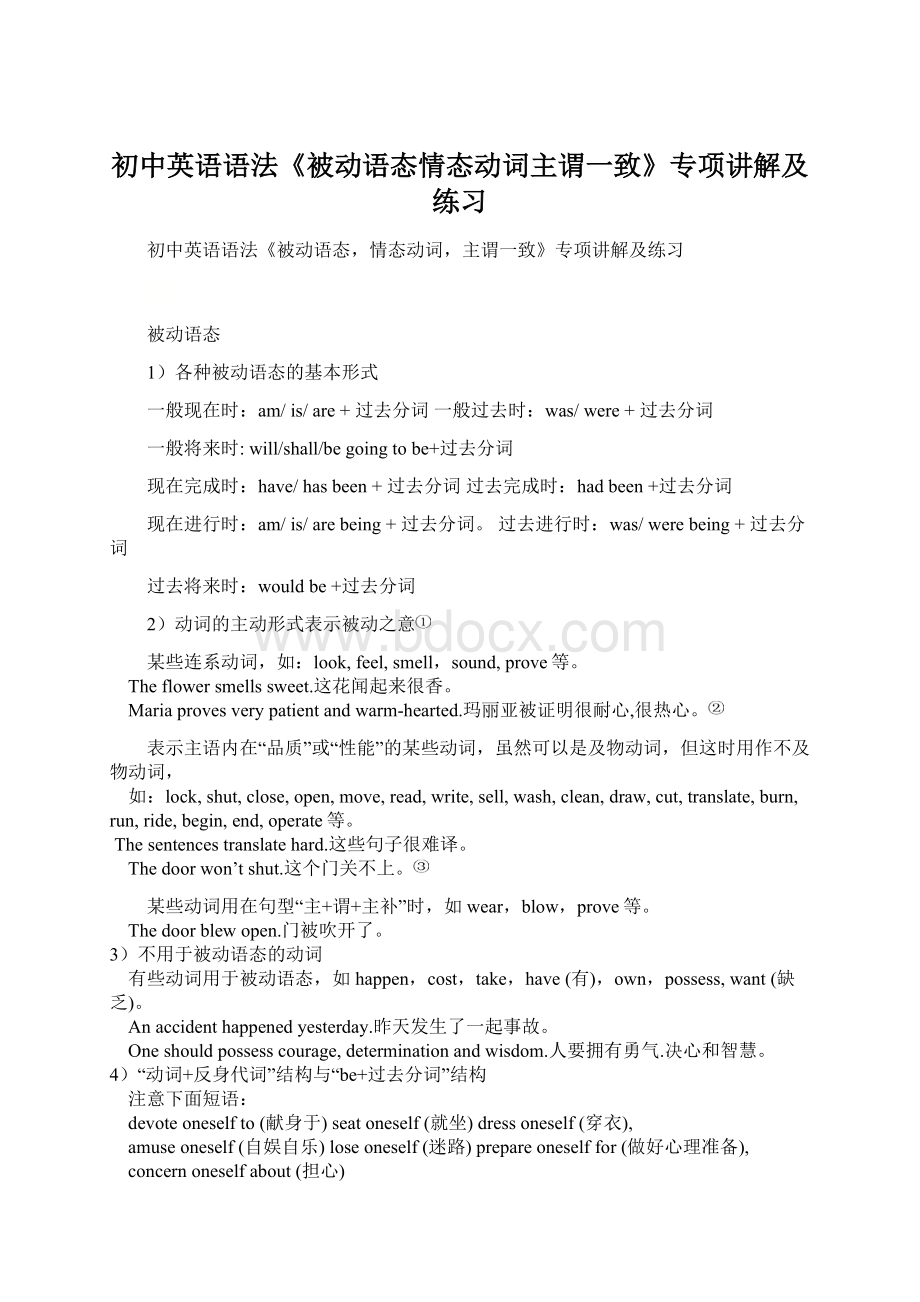初中英语语法《被动语态情态动词主谓一致》专项讲解及练习.docx
《初中英语语法《被动语态情态动词主谓一致》专项讲解及练习.docx》由会员分享,可在线阅读,更多相关《初中英语语法《被动语态情态动词主谓一致》专项讲解及练习.docx(13页珍藏版)》请在冰豆网上搜索。

初中英语语法《被动语态情态动词主谓一致》专项讲解及练习
初中英语语法《被动语态,情态动词,主谓一致》专项讲解及练习
被动语态
1)各种被动语态的基本形式
一般现在时:
am/is/are+过去分词一般过去时:
was/were+过去分词
一般将来时:
will/shall/begoingtobe+过去分词
现在完成时:
have/hasbeen+过去分词过去完成时:
hadbeen+过去分词
现在进行时:
am/is/arebeing+过去分词。
过去进行时:
was/werebeing+过去分词
过去将来时:
wouldbe+过去分词
2)动词的主动形式表示被动之意
某些连系动词,如:
look,feel,smell,sound,prove等。
Theflowersmellssweet.这花闻起来很香。
Mariaprovesverypatientandwarm-hearted.玛丽亚被证明很耐心,很热心。
表示主语内在“品质”或“性能”的某些动词,虽然可以是及物动词,但这时用作不及物动词,
如:
lock,shut,close,open,move,read,write,sell,wash,clean,draw,cut,translate,burn,run,ride,begin,end,operate等。
Thesentencestranslatehard.这些句子很难译。
Thedoorwon’tshut.这个门关不上。
某些动词用在句型“主+谓+主补”时,如wear,blow,prove等。
Thedoorblewopen.门被吹开了。
3)不用于被动语态的动词
有些动词用于被动语态,如happen,cost,take,have(有),own,possess,want(缺乏)。
Anaccidenthappenedyesterday.昨天发生了一起事故。
Oneshouldpossesscourage,determinationandwisdom.人要拥有勇气.决心和智慧。
4)“动词+反身代词”结构与“be+过去分词”结构
注意下面短语:
devoteoneselfto(献身于)seatoneself(就坐)dressoneself(穿衣),
amuseoneself(自娱自乐)loseoneself(迷路)prepareoneselffor(做好心理准备),
concernoneselfabout(担心)
这些短语经常用被动结构表示主动意义。
Theywereseatedinthefrontofthehall.他们在大厅前部就坐。
Hewasconcernedabouthiswork.他担心他的工作。
Allmystudentsarewellpreparedforthetest.我的学生都为考试做好了准备。
Hismotherisdressedinwhiteattheparty.他的妈妈在宴会上穿着白色衣服。
1)被动语态在不同时态(含有情态动词)中的运用;
Asusual,Meihua________at6:
30thismorningbyhermothertogetreadyforschool.
A.haswokenupB.wokeupC.wakesupD.waswokenup
【解析】hermotherwokeupMeihuaatat6:
30thismorning.
Meihuawaswokenupat6:
30thismorningbyhermothers.
2)含有介词的短语动词的被动用法;
Aneighbourhelpedtokeepourdog.It______whilewewereonholiday.
A.wastakencareB.tookcareofC.istakencareofD.wastakencareof
3)双宾结构以及复合宾语结构的主动变被动的用法
Thepolicemanmadetheyoungwomanmovehercar.
Theyoungwomanwasmadetomovehercarbythepoliceman.
MissKingsawBillhelpingablindmancrossthestreetyesterdayafternoon.
YesterdayafternoonBillwasseenhelpingablindmancrossthestreetbyMissKing.
1)They______________printing500copiesbytheendoflastmonth.
A.hadfinished B.havefinished C.hadbeenfinished D.havebeenfinished
2)Greatchanges______________place.Manynewschools______________.
A.havetaken,havebeenopened B.take,areopen
C.aretaken,open D.havebeentaken,areopened
3)Wecan’tusethebridgenow,becauseit______________.
A.hasbeenrepaired B.isrepairing C.isrepaired D.isbeingrepaired
4)I______________thewaytotherailwaystationbyapoliceman.
A.wasshown B.showed C.haveshown D.wasshowing
5)Thewartheoldsoldierremembersverywell______________in1941.
A.brokeout B.hadbeenbrokenout
C.wasbrokenout D.hadbrokenout
6)Whenwater______________,itwillbechangedintovapour.
A.isheated B.heating C.hasheated D.heats
7)Wecan’tentertheroombecauseitsdoor______________,butyoucouldn’tlockitatallbefore.
A.locked B.locks C.islocked D.islocking
8)They______________dayandnight,sotheyhadnotimetostaywiththeirfamilies.
A.aremadework B.aremadetowork
C.madetobeworked D.aremakingtowork
9)Man-madesatellites______________intospacebymanycountries.
A.wassentup B.issentup
C.havebeensentup D.hasbeensentup
10)When______thePeople’sRepublicofChina_____?
A.was,found B.was,founded C.did,found D.does,found
情态动词
1)情态动词的否定意义
can’t可译为“不会”,如:
Ican’tplaybasketball.我不会打篮球。
当句子表推测时,用can’t表达不可能,
如:
Hecan’tbeill.HeisplayingchesswithTom.他不可能病了,他正和Tom下棋呢。
can’t还可用来回答“MayI…?
”这样的问句。
如:
MayIcomein?
我可以进来吗?
No,youmustn’t./can’t.不,你不能。
can’t还可用于固定习语中。
can’thelpdoing禁不住,…情不自禁…can’twaittodosth迫不及待…
如:
Shecan’thelpcrying.她不禁大哭起来。
Thechildrencan’twaittoopenthebox.孩子们迫不及待地想打开盒子。
may的否定式为maynot,译成“可能不”,
如:
Hemaynotbeathome.他也许不在家。
mustn’t表示不许,不可。
如:
Hemustn’tleavehisroom.他不许离开他的房间。
Youmustn’ttalkinclass.你们不可以在课上说话。
mustn’t也可用于以may表示要求时的否定回答中。
如:
—MayIstandhere?
我可以站在这里吗?
—No,youmustn’t(can’t).不,不行。
needn’t意为“不必”。
如:
Youneedn’tmeethimunlessyou’dliketo.你不需要见他,除非你愿意。
needn’t+have+动词的过去分词,表不需要完成但已完成的动作,暗含时间或精力上的浪费。
如:
Youneedn’thaveboughtit.你没必要买它(但你却买了)。
shouldn’t表示不应该。
如:
Youshouldn’tfeelsounhappyoversuchlittlethings.对于这种小事,你不应该感到这么不高兴。
2)情态动词表示推测的用法:
can表示推测时一般用于否定句或疑问句。
如:
Thatmancan'tbeherhusband.sheisstillsingle.
Whoisknockingatthedoor?
Canitbethepostman?
must表示肯定的推测,一般用于肯定句中。
如:
Hemustbeinhisofficenow.MrLimustbeworkingnow,forthelightsinhisofficearestillon.
might表示推测时不一定是may的过去时,只是表示其可能性较小。
如:
Themanmaybetheheadmaster.
—WhereisMrLi?
—Hemightbeworkinginhisoffice.—MayMrLicome?
—Hemightnotcomehere.
Could表示推测时,语气can比要弱,说话者留有余地。
如:
—Coulditbeananimal?
—Itcouldnotbe,becauseitisnotmoving.
Should表示推测的可能性比较大,仅比must的可能性小一点。
如:
Itisalready10o’clocknowtheyshouldbethere.
3)情态动词完成式用法
“must+havedone/been------”表示“过去一定发生过某事或存在过某种状态”,不用于“musn’t+have-----”形式。
如:
Shemusthaveseenthefilmbefore,hasn’tshe?
(注意反意疑问句的后半部分)
YoumusthavemetuncleWangintheshopyesterday,didn’tyou?
(注意反意疑问句的后半部分)
“should+havedone/been-------”表示“本应当做某事,而实际上并没有做”;“shouldn’t+完成式”表示“本来不应当做,而实际上却做了”。
以上结构常带有说话者的责备的感情色彩。
如:
Youshouldhavefinishedyourhomeworkearlier(butinfactyoudidnotfinishitontime).
Youshouldn’thavegonetobedwhenyouwokeupatfive(butinfactyouwenttobedagainthen).
“needn’t+完成式”表示“本来没有必要做某事,而实际上却做了”。
如:
Therewasplentyoftime.Sheneedn'thavehurried.
“can’t/couldn’t+havedone/been-------”表示“过去不可能发生了某事或存在过某种状态”。
如:
Isawhimjustnow.Hecan’thavegonetoJapan.
Shesaidthemancouldn’thavestolenhercar.
“could+havedone/been-------”表示“过去本来能够,可以做某事或成为某种状态,而实际上没有”,说话者有些遗憾。
“couldsb.havedone/been-------?
”是它的问句形式。
如:
YoucouldhavestayedwiththeSmithswhileyouwereinNewYork(butinfactyoustayedinanearbyhotel.)CouldMrLihavehelpedthisgirlstudent?
“may/might+完成式”表示“过去可能,本来可以于某事而实际上没有干”,might的可能性较小,语气较弱。
如:
Hemayhavefinishedreadingthebook.Shemighthavegivenyousomehelp,howeverbusyshewas.
1)—Willyoustayforsomemoredays?
—Sorry,I_____.Mymothercalledtoaskmetogobackatonce.
A.mustn’tB.maynotC.can’tD.wouldn’t
【解析】C情态动词表推测。
句意:
-你再呆几天好吗?
-对不起,我不能,我的母亲打电话让我马上回去。
Mustn’t禁止;maynot可能不;wouldn’t不愿做……,将要不……。
故选C。
2)You______wearsportsshoeswhenyouclimbamountain.
A.can’tB.shouldn’tC.mustn’tD.haveto
【解析】D考查情态动词的用法。
根据句意:
爬山的时候你不得不穿运动鞋。
前三个选项句意不通顺,故选D。
3)–MustIgetupearlytomorrowmorning?
–No,_________.
A.youmustn’tB.Idon’tthinkyouhaveto
C.youcan’tD.youneed
【解析】B考查情态动词的用法。
情态动词must引导的一般疑问句的否定答语为“No,sb.needn’t./No,sb.don’thaveto.”故选B。
4)—Who’ssinginginthenextroom?
—It____beher.ShehasgonetoNewYork.
A.can’tB.mustC.shouldn’tD.can
【解析】A考查情态动词表推测。
表示否定推测时,用can’t,意为“一定不……”。
must表示推测时,意为“一定……”,用于肯定句;根据答语“她已经去了纽约”可知是否定推测,故选A。
5)—MustIlearnallthesewordsbyheart?
—No,you______.It’llbefineifyoucopytheminyourexercisebooks.
A.needn’tB.can’tC.shouldn’tD.mustn’t
【解析】A情态动词的用法。
由must引导的问句,否定回答用needn’t。
句意是“我必须都要记住这些单词吗”“不用,只要你抄在练习本上就可以了”。
6)—Mom,mustIfinishmyhomeworknow?
—No,you______.Youmayhavesupperfirst.
A.mustn’tB.needn’tC.can’t
【解析】选B。
考查情态动词的用法。
对must引导的一般疑问句,否定回答时常用No,…needn’t.由句意:
-妈妈,我现在必须完成家庭作业?
-不,你不需要。
你可以先吃饭。
故选B。
1)MrWang______beinNanjingnow,hewenttoBeijingonlythismorning.
A.mustn’tB.maynotC.can’tD.needn’t
2)–MustIstayathome,Mum?
--No,you______.
A.needn’tB.mustn’tC.don’tD.maynot
3)Thesebooks______outofthereadingroom.Youhavetoreadthemhere.
A.can’ttakeB.mustbetakenC.cantakeD.mustn’tbetaken
4)Eventhetopstudentsinourclasscan’tworkoutthisproblem.Soit______beverydifficult.
A.canB.mayC.mustD.need
5)It’sstillearly.You______.
A.mustn’thurryB.wouldn’thurry
C.maynothurryD.don’thavetohurry
6)--______themantherebeournewteacher?
--He______be,butI’mnotsure.
A.May;mustn’tB.Can;mayC.Must;can’tD.Can;can’t
7)–Someoneisknockingatthedoor.Who______itbe?
--It______beTom.Heisstillintheschool.
A.can;can’tB.can;mustn’tC.might;couldD.might;may
8)You_____insuchahurry,I’llhavethecarwaitingforyou.
A.don’tneedbeingB.don’thavebeenC.neednottobeD.needn’tbe
9)Ihavekeptthebookfor3weeksandI_______themtothelibrarylastweek.
A.oughtreturnB.oughttoreturn
C.oughthavereturnedD.oughttohavereturned
10)---______Igetyousomefood?
---No.thanks.
A. MightB.ShallC.WillD.Ought
主谓一致
1)语法一致的原则
以单数名词或代词,动词不定式短语作主语时,谓语动词要用单数;主语为复数时,谓语用复数,Hegoestoschoolearlyeverymorning.
由and或both……and连接的并列成分作主语时,谓语动词用复数。
BothheandIareright.
但并列主语如果指的是同一人,同一事物或同一概念,谓语动词用单数。
Histeacherandfriendisabeautifulgirl.
由and连接的并列单数主语之前如果分别由each,every修饰时,其谓语动词要用单数形式。
Inourcountryeveryboyandeverygirlhastherighttoreceiveeducation.
主语是单数时,尽管后面跟有but,except,besides,with等介词短语,谓语动词仍用单数。
一些只有复数形式的名词如people,police,cattle,clothes等作主语时,谓语动词要用复数。
Alotofpeoplearedancingoutside.
由each,some,any,no,every构成的复合代词作主语时,谓语动词都用单数。
Iseverybodyready?
有两部分构成的物体的名词,如glasses,shoes,trousers,chopsticks,scissors等作主语时,谓语动词用复数。
Wherearemyshoes?
Ican’tfindthem.
2)意义一致的原则
表时间、距离、价格、度量衡等的名词作主语时,谓语动词通常用单数
Twentyyearsisnotalongtime.